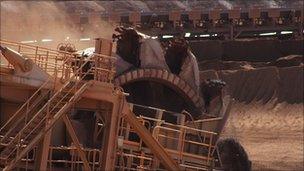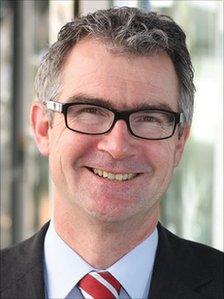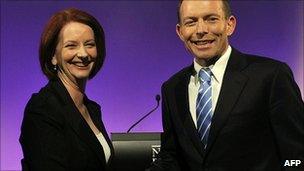Australian firms fear migrant curbs
- Published

Will migrant curbs halt Australia's mining boom?
Australia is to put a squeeze on immigration after both main parties contesting the 21 August federal election promised to curb the flow of new settlers.
The move has drawn an exasperated response from the business community, which is worried about a worsening skills shortage.
The conservative opposition says it would cut the number of migrants by almost half from its current annual rate of 300,000 people if it wins this month's election.
At the same time, Labor Prime Minister Julia Gillard has also promised to reduce immigration to more "sustainable" levels.
Both sides are acutely aware that many Australians are deeply anxious at what they see as the perils of a bloated population, with added pressure on housing, health services and water supplies, as well as more congestion on clogged city streets.
But James Pearson, the chief executive of the Chamber of Commerce and Industry of Western Australia, believes plans to restrict immigrant numbers are short-sighted.
"Australia is a migrant-based society," he says. "We're one of the few parts of the developed world which really is crying out for new, skilled workers.
"The real danger to Western Australia, and the Australian economy more broadly, is that if we can't fill the jobs that are being created, then some projects will be delayed, some may not even go ahead and all of the knock-on effects that ripple through the economy will therefore be lost," he told the BBC from his office in Perth.
Boom under threat
Industry groups estimate that 500,000 new jobs will be created in Western Australia, the nation's money-making powerhouse, in the coming decade as the mining boom accelerates.

James Pearson says Australia is crying out for skilled workers
It is expected to turbo-charge the state's economic growth to about 6% annually over the next three years, while its unemployment level is set to sink below the national average.
There is a warning, though, that more than 200,000 positions across a range of sectors in Western Australia will remain vacant unless there is an influx of qualified staff from overseas.
Australian agriculture is also reporting a skills deficit, with a dearth of agronomists, vets and managers, through to those with experience of operating harvesting machinery and shearers.
"The farmers, unfortunately, don't have enough workers," says Denita Wawn from the National Farmers' Federation.
"We are estimating that we need up to 100,000 additional workers over the next five years."
The vast majority of these jobs will be in the skilled or semi-skilled category as agriculture becomes more technologically advanced.
"We are very concerned that the lack of people will impede increased productivity," says Ms Wawn, adding that farmers would be "exceptionally concerned" if a revamped immigration programme did not have the requisite flexibility to meet their specific needs.
Keeping pace
Despite assertions by business groups that Australia simply is not training enough of its own to bridge the skills gap, the director of the TAFE New South Wales Sydney Institute, David Riordan, says the system is not being overwhelmed.

PM Julia Gillard and opposition leader Tony Abbott are both migrants themselves
"I think we are keeping abreast of the growth [in jobs] and we are providing a trained workforce," says Mr Riordan, who runs the largest educational and vocational establishment in the southern hemisphere.
He is responsible for 1,200 different courses, from commercial cookery and fashion to information technology and mortuary practice, that cater for 75,000 mostly Australian students.
"Anybody in education is really burdened by this whole issue of making sure that we are training people for jobs," says Mr Riordan.
"We try to make sure we have very strong links with industry to identify what their training and skills needs are, so we are actually training people for jobs."
As election day approaches, Prime Minister Julia Gillard and her opposition Liberal Party rival Tony Abbott - incidentally, both migrants from Britain - have insisted that any scaling back of immigration will not damage the hearty glow of the Australian economy.